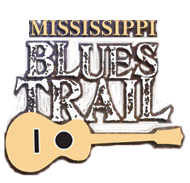This Week’s Featured Marker:
Elmore James {module_photogallery,22317,5,,5,80,,true}
Holmes County celebrated the legacy of blues guitarists Elmore James and Lonnie Pitchford with the dedication of the Mississippi Blues Trail’s 167th marker on December 3, 2012, at the Newport Community Cemetery in Ebenezer. James and Pitchford are both buried in the cemetery, along with Pitchford’s parents, who both played guitar, and guitar and bass player Curtis Price. James (1918-1963) established the slide guitar style as a crucial element of electric blues in the 1950s. The fiery intensity of James’ guitar playing, in which he used a metal tube to “slide” atop the guitar strings, was matched by the gritty passion of his blues singing. James’ style, built on the approach of Robert Johnson, established a template since used by generations of blues and rock musicians.
His grave in the Newport Community Cemetery is marked by a “King of the Slide Guitar” sculpture, which was dedicated at a ceremony sponsored by the Mt. Zion Memorial Fund in 1992. Funds for the granite headstone were raised by Phil Walden of Capricorn Records, one of the many labels that have reissued James’ classic recordings. The headstone features a bronze relief by sculptor Dr. Sam Barnes, who was also Walden’s dentist. (Walden joked that he agreed to Barnes’ suggestion to do the sculpture while he under the effects of a painkiller.)
James, whose hits included “Dust My Broom,” “The Sky Is Crying,” and “It Hurts Me Too,” is mentioned or pictured on several other markers on the blues trail in Canton, Jackson, Lexington and Tchula, but Ebenezer was designated as as the primary site to honor his life and music. James died of a heart attack at the age of 45 in Chicago.
Lonnie Pitchford (1955-1998) was one of the many guitarists influenced by the music of James and Robert Johnson. He was an heir to the musical traditions of both, although he never knew James, nor, of course Johnson (who died in 1938). His widow Minnie, pictured here speaking at the marker dedication, was the daughter of one of James’ girlfriends, from whom Pitchford learned a song that James sang but never recorded (“Don’t You Do That No More”). Pitchford was directly mentored in the 1980s by Robert Jr. Lockwood, who in turn had learned from Robert Johnson. Pitchford was also famed for his playing on the “diddley bow,” a homemade one-string guitar, and at his concerts he sometimes built the instrument onstage and then played it. His headstone, also sponsored by the Mt. Zion Memorial Fund with donations from John Fogerty of Creedence Clearwater Revival and Rooster Blues Records of Clarksdale, originally had a playable one-string attached on one side. Like James, Pitchford died relatively young — at 43 — depriving the blues world of another immense talent.
[ BACK TO TOP ]
